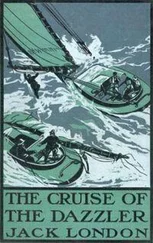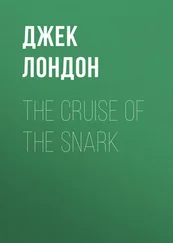Jack London - The Cruise of the Snark
Здесь есть возможность читать онлайн «Jack London - The Cruise of the Snark» весь текст электронной книги совершенно бесплатно (целиком полную версию без сокращений). В некоторых случаях можно слушать аудио, скачать через торрент в формате fb2 и присутствует краткое содержание. Жанр: Классическая проза, Морские приключения, на английском языке. Описание произведения, (предисловие) а так же отзывы посетителей доступны на портале библиотеки ЛибКат.
- Название:The Cruise of the Snark
- Автор:
- Жанр:
- Год:неизвестен
- ISBN:нет данных
- Рейтинг книги:3 / 5. Голосов: 1
-
Избранное:Добавить в избранное
- Отзывы:
-
Ваша оценка:
- 60
- 1
- 2
- 3
- 4
- 5
The Cruise of the Snark: краткое содержание, описание и аннотация
Предлагаем к чтению аннотацию, описание, краткое содержание или предисловие (зависит от того, что написал сам автор книги «The Cruise of the Snark»). Если вы не нашли необходимую информацию о книге — напишите в комментариях, мы постараемся отыскать её.
The Cruise of the Snark — читать онлайн бесплатно полную книгу (весь текст) целиком
Ниже представлен текст книги, разбитый по страницам. Система сохранения места последней прочитанной страницы, позволяет с удобством читать онлайн бесплатно книгу «The Cruise of the Snark», без необходимости каждый раз заново искать на чём Вы остановились. Поставьте закладку, и сможете в любой момент перейти на страницу, на которой закончили чтение.
Интервал:
Закладка:
We found the variables in 11 degrees north latitude, and 11 degrees north latitude we hugged jealously. To the south lay the doldrums. To the north lay the northeast trade that refused to blow from the northeast. The days came and went, and always they found the Snark somewhere near the eleventh parallel. The variables were truly variable. A light head-wind would die away and leave us rolling in a calm for forty-eight hours. Then a light head-wind would spring up, blow for three hours, and leave us rolling in another calm for forty-eight hours. Then—hurrah!—the wind would come out of the west, fresh, beautifully fresh, and send the Snark along, wing and wing, her wake bubbling, the log-line straight astern. At the end of half an hour, while we were preparing to set the spinnaker, with a few sickly gasps the wind would die away. And so it went. We wagered optimistically on every favourable fan of air that lasted over five minutes; but it never did any good. The fans faded out just the same.
But there were exceptions. In the variables, if you wait long enough, something is bound to happen, and we were so plentifully stocked with food and water that we could afford to wait. On October 26, we actually made one hundred and three miles of easting, and we talked about it for days afterwards. Once we caught a moderate gale from the south, which blew itself out in eight hours, but it helped us to seventy-one miles of easting in that particular twenty-four hours. And then, just as it was expiring, the wind came straight out from the north (the directly opposite quarter), and fanned us along over another degree of easting.
In years and years no sailing vessel has attempted this traverse, and we found ourselves in the midst of one of the loneliest of the Pacific solitudes. In the sixty days we were crossing it we sighted no sail, lifted no steamer's smoke above the horizon. A disabled vessel could drift in this deserted expanse for a dozen generations, and there would be no rescue. The only chance of rescue would be from a vessel like the Snark, and the Snark happened to be there principally because of the fact that the traverse had been begun before the particular paragraph in the sailing directions had been read. Standing upright on deck, a straight line drawn from the eye to the horizon would measure three miles and a half. Thus, seven miles was the diameter of the circle of the sea in which we had our centre. Since we remained always in the centre, and since we constantly were moving in some direction, we looked upon many circles. But all circles looked alike. No tufted islets, gray headlands, nor glistening patches of white canvas ever marred the symmetry of that unbroken curve. Clouds came and went, rising up over the rim of the circle, flowing across the space of it, and spilling away and down across the opposite rim.
The world faded as the procession of the weeks marched by. The world faded until at last there ceased to be any world except the little world of the Snark, freighted with her seven souls and floating on the expanse of the waters. Our memories of the world, the great world, became like dreams of former lives we had lived somewhere before we came to be born on the Snark. After we had been out of fresh vegetables for some time, we mentioned such things in much the same way I have heard my father mention the vanished apples of his boyhood. Man is a creature of habit, and we on the Snark had got the habit of the Snark. Everything about her and aboard her was as a matter of course, and anything different would have been an irritation and an offence.
There was no way by which the great world could intrude. Our bell rang the hours, but no caller ever rang it. There were no guests to dinner, no telegrams, no insistent telephone jangles invading our privacy. We had no engagements to keep, no trains to catch, and there were no morning newspapers over which to waste time in learning what was happening to our fifteen hundred million other fellow-creatures.
But it was not dull. The affairs of our little world had to be regulated, and, unlike the great world, our world had to be steered in its journey through space. Also, there were cosmic disturbances to be encountered and baffled, such as do not afflict the big earth in its frictionless orbit through the windless void. And we never knew, from moment to moment, what was going to happen next. There were spice and variety enough and to spare. Thus, at four in the morning, I relieve Hermann at the wheel.
"East-northeast," he gives me the course. "She's eight points off, but she ain't steering."
Small wonder. The vessel does not exist that can be steered in so absolute a calm.
"I had a breeze a little while ago—maybe it will come back again," Hermann says hopefully, ere he starts forward to the cabin and his bunk.
The mizzen is in and fast furled. In the night, what of the roll and the absence of wind, it had made life too hideous to be permitted to go on rasping at the mast, smashing at the tackles, and buffeting the empty air into hollow outbursts of sound. But the big mainsail is still on, and the staysail, jib, and flying-jib are snapping and slashing at their sheets with every roll. Every star is out. Just for luck I put the wheel hard over in the opposite direction to which it had been left by Hermann, and I lean back and gaze up at the stars. There is nothing else for me to do. There is nothing to be done with a sailing vessel rolling in a stark calm.
Then I feel a fan on my cheek, faint, so faint, that I can just sense it ere it is gone. But another comes, and another, until a real and just perceptible breeze is blowing. How the Snark's sails manage to feel it is beyond me, but feel it they do, as she does as well, for the compass card begins slowly to revolve in the binnacle. In reality, it is not revolving at all. It is held by terrestrial magnetism in one place, and it is the Snark that is revolving, pivoted upon that delicate cardboard device that floats in a closed vessel of alcohol.
So the Snark comes back on her course. The breath increases to a tiny puff. The Snark feels the weight of it and actually heels over a trifle. There is flying scud overhead, and I notice the stars being blotted out. Walls of darkness close in upon me, so that, when the last star is gone, the darkness is so near that it seems I can reach out and touch it on every side. When I lean toward it, I can feel it loom against my face. Puff follows puff, and I am glad the mizzen is furled. Phew! that was a stiff one! The Snark goes over and down until her lee-rail is buried and the whole Pacific Ocean is pouring in. Four or five of these gusts make me wish that the jib and flying-jib were in. The sea is picking up, the gusts are growing stronger and more frequent, and there is a splatter of wet in the air. There is no use in attempting to gaze to windward. The wall of blackness is within arm's length. Yet I cannot help attempting to see and gauge the blows that are being struck at the Snark. There is something ominous and menacing up there to windward, and I have a feeling that if I look long enough and strong enough, I shall divine it. Futile feeling. Between two gusts I leave the wheel and run forward to the cabin companionway, where I light matches and consult the barometer. "29-90" it reads. That sensitive instrument refuses to take notice of the disturbance which is humming with a deep, throaty voice in the rigging. I get back to the wheel just in time to meet another gust, the strongest yet. Well, anyway, the wind is abeam and the Snark is on her course, eating up easting. That at least is well.
The jib and flying-jib bother me, and I wish they were in. She would make easier weather of it, and less risky weather likewise. The wind snorts, and stray raindrops pelt like birdshot. I shall certainly have to call all hands, I conclude; then conclude the next instant to hang on a little longer. Maybe this is the end of it, and I shall have called them for nothing. It is better to let them sleep. I hold the Snark down to her task, and from out of the darkness, at right angles, comes a deluge of rain accompanied by shrieking wind. Then everything eases except the blackness, and I rejoice in that I have not called the men.
Читать дальшеИнтервал:
Закладка:
Похожие книги на «The Cruise of the Snark»
Представляем Вашему вниманию похожие книги на «The Cruise of the Snark» списком для выбора. Мы отобрали схожую по названию и смыслу литературу в надежде предоставить читателям больше вариантов отыскать новые, интересные, ещё непрочитанные произведения.
Обсуждение, отзывы о книге «The Cruise of the Snark» и просто собственные мнения читателей. Оставьте ваши комментарии, напишите, что Вы думаете о произведении, его смысле или главных героях. Укажите что конкретно понравилось, а что нет, и почему Вы так считаете.







